Greetings from Gutu!
After having spent one week in Kathmandu adjusting to the Nepali pace of life, combatting cultural shock and immersing myself in work at CAED, it was time to embark upon yet another adventure. On Friday the 21st of June, I set off into the field accompanied by three delightful members of staff: Indira, Ram and Krishna. We embarked upon a gruelling 18-hour bus journey to the region of Surkhet in the West of Nepal. After spending a few days in the town of sunny Surkhet recovering from the journey, we were ready for the second leg of our bumpy ride. From Surkhet we went to the village of Gutu with the purpose of studying the practice of Chhaupadi, which remains prevalent in this region.
Home in Surkhet: A Lovely Guesthouse
We stayed with a friendly family who welcomed us into their home and cooked us delicious meals every day. Their home was our base, from which we visited different families every day, conducting a survey about the practice of Chhaupadi. I was accompanied by three lovely people: Indira, an intern at CAED this summer who is studying Public Health at MMIHS in Kathmandu, acted as my translator and general buddy throughout the trip. Ram, a member of staff at the Surkhet office, used his expertise and experience to help us interview people. Our third team member was Gersha, an ‘MCC’ (Modal Couple Campaigner) in Gutu. MCCs are those people who are affiliated with CAED but are members of the local communities. They promote the values and work of CAED within these communities, and reflect the strong field presence of the organisation.
Home in Gutu!
Before we got started, I decided to find out more about what had encouraged my enthusiastic team members to join CAED. Indira was keen to elaborate upon her motivation to join, and she explained that “CAED has always worked for women and girls so I was really excited to work with them and go into the field. I am really grateful that they provided me with the opportunity to come to Surkhet and find out about the situation of Chhaupadi.”
Indira and I embarking upon the adventure!
As a student, Indira finds it important to learn about the implementation of development projects in practice. She highlighted that “learning about a problem in a classroom and observing the problem in practice is totally different. CAED has a strong field presence and finds solutions to these issues through the locals themselves.” This is something that I am also interested in learning more about. Studying in Geneva and observing development working in International Organisations and NGOs is fascinating, but I have always wanted to understand how the concepts promoted by these organisations are implemented in practice.
I then had a chat with Ram, who is from Surkhet and has worked with CAED for a number of years. He told me about his interest in women’s health issues, highlighting the value of the work that the organisation is doing in promoting women’s reproductive rights all over the country. Ram emphasised how much he adores working in the field, elaborating upon the particular role of young people in changing and challenging social norms: “I love working with young people, especially adolescents. I want to educate them from childhood because that’s how we can bring about real change. The field helps me to understand the intricacies of the actual problems that we are facing.”
Ram has a lot of experience working in the field!
I asked Ram to elaborate upon why the issue of Chhaupadi is so relevant and important in today’s society. “Chhaupadi goes against the fundamental human rights of women,” he elucidated, “It stops them from prospering and maintaining their physical health.” Ram also talked about the complexity of changing a social norm. “Chhaupadi is a dangerous tradition which has a part of many people’s lives for a long time. It is therefore incredibly hard to change people’s minds, and to end this practice.”
I decided to ask Ganesh, the local MCC, about his opinion on the issue of Chhaupadi. He insisted upon the importance of getting women out of the Chhau Goth, but suggested that certain things should not be allowed for a menstruating woman. “I think that women should not be kept in the Chhau Goth. They should stay in a separate room inside their homes, and they should not cook food or go to the temple.” His view reflects the Hindu belief that women are impure during their menstruation, and that touching food or men may contaminate them.
Ganesh reflects on his experiences with CAED
I asked both men about the law against Chhaupadi, which states that if you insist upon the practice of Chhaupadi you can face up to three months in jail or a 3000 rupee fine (about $30). Ram pointed out that the law was limited because “only making a law does not work. There must be proper implementation of it, which is not happening today.” Ganesh chipped in that “The fine should be increased and it should be implemented. There hasn’t been a single case reported and nobody has been punished, so the law has not been taken seriously. I think the the local government should work for the implementation of this law, but also that people should report the practice of Chhaupadi in their communities.”
So does is there any hope for the future? Ram concluded that: “I think Chhaupadi will be eliminated in the future. But we need to promote and implement the law, so that people stop practicing this damaging tradition.” “It will be eliminated but it needs time,” Ganesh added, “Our forefathers used to stay in a Chhau Goth for 7 days, and now its only 5 days. A new generation will bring a change in people.”
On this hopeful note, we continued our quest to find out more about the issue of Chhaupadi in Gutu.
Ram, Krishna, Ganesh and Indira (right to left) on the road!
Posted By Boroka Godley (Nepal)
Posted Jul 9th, 2019


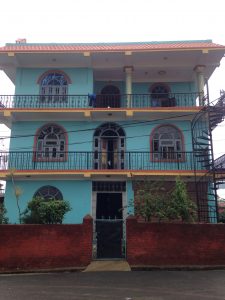
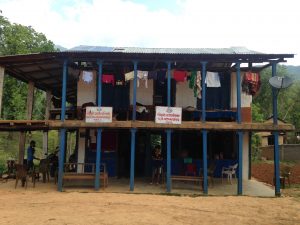
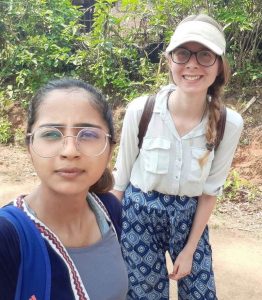
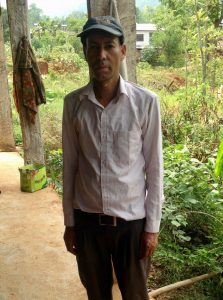
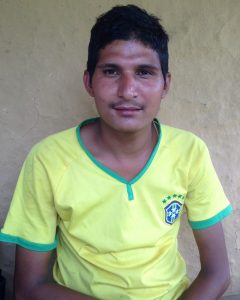
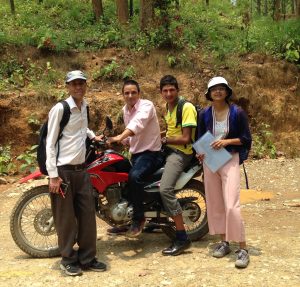
5 Comments
rachel wright
July 9, 2019
I loved hearing about your experiences with CAED’s staff as well as community members’ opinions about the practice and the law surrounding it!
Emily
July 9, 2019
This is a great example of how important effective policy and implementation are in making social change. It seems like you and the other leaders are really passionate about this project, and I have a lot of hope that you will achieve a lot while you’re there. Keep it up!
Abby Lahvis
July 10, 2019
Wow, this was very interesting. I loved hearing CAED’s perspective on things because I think that reflects on the reasons why we chose to partner with them in the first place.
iain
July 15, 2019
Interesting that CAED staff feel the new law needs to be used and enforced. Do any of them have any ideas about how that might happen? As you know we would like any information about the law that you can find. Glad that you arrived safe and sound!!
Sam Nass
July 23, 2019
I’m so happy to hear more about your experiences. I think it’s really interesting that there is such a wide spectrum of opinions on the practice of Chhaupadi within the local communities. Changing tradition may be hard, but it seems like the prevalence of Chhaupadi diminishes with every generation.